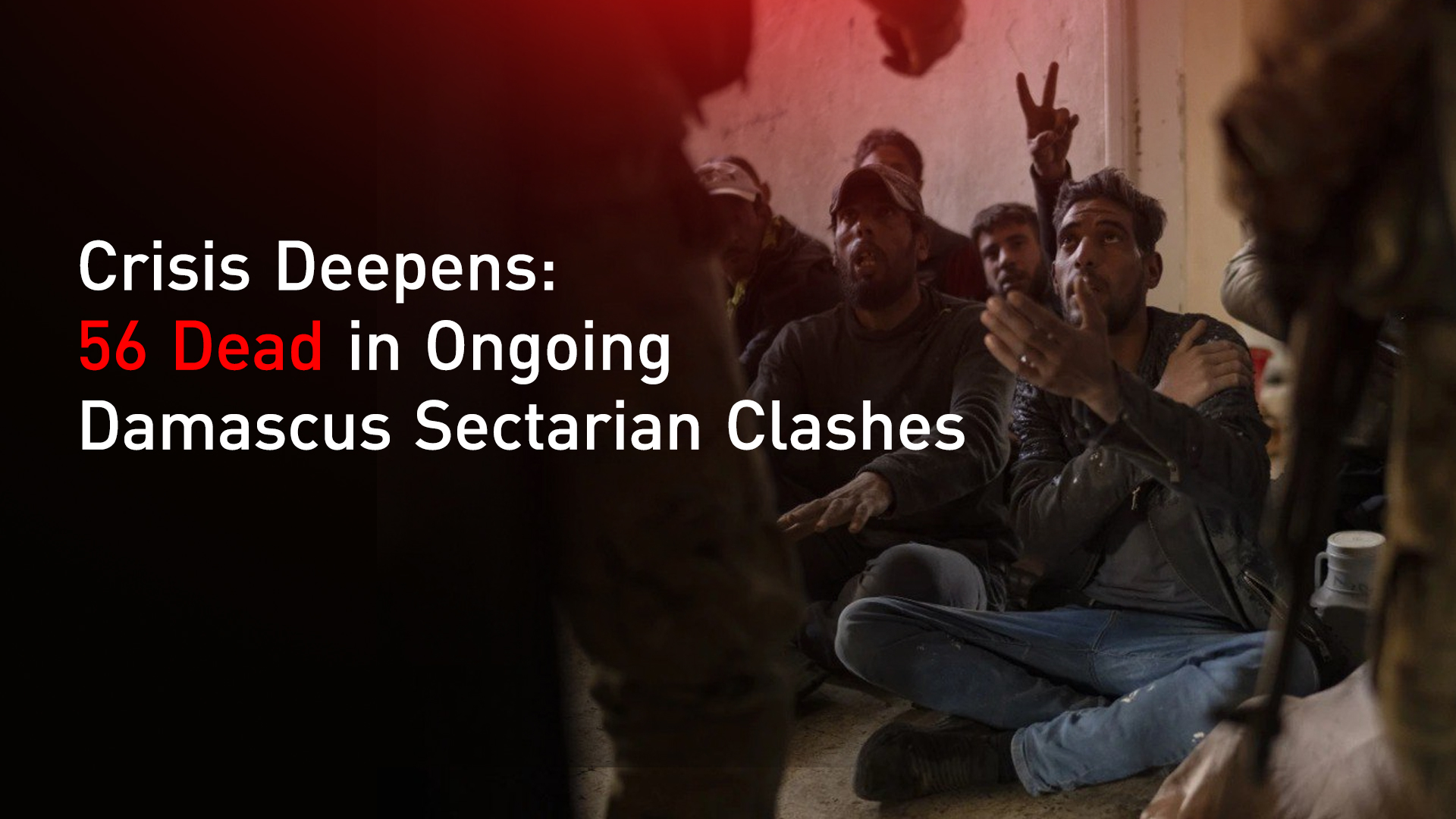Death Toll in Southern Damascus Climbs to 56 as Sectarian Tensions Spiral
Sheikh Hikmat Salman Al-Hajri expressed hope for achieving justice and transitional justice, as well as establishing a decentralized civilian government that reflects the aspirations of the people.

By Ahora Qadi
ERBIL (Kurdistan24) – The death toll from recent clashes in the Damascus countryside has risen to 56, with reports of field executions, Israeli airstrikes, and intense confrontations between local Druze fighters and forces loyal to Syria’s new government, according to the UK-based Syrian Observatory for Human Rights (SOHR).
Nine Druze men were reportedly executed in the field and some of their bodies burned after falling into an ambush laid by Syrian government forces and affiliated militias. The ambush occurred on the Damascus–Sweida highway as a convoy of Druze youths made their way toward Sahnaya to support local armed groups in the area. This incident alone brought the Druze death toll to 15, with the number expected to rise due to multiple injuries.
Bloodshed Engulfs Ashrafiyah Sahnaya and Jaramana
The security situation deteriorated rapidly in Ashrafiyah Sahnaya, a suburb of Damascus, where Syrian Defense Ministry forces seized control following intense urban clashes with Druze fighters. The town was rocked by airstrikes attributed to Israeli jets, coinciding with drone activity in the area.
Local reports confirmed the closure of all entry and exit points to the town, with Syrian forces deploying across key districts, including al-Maamel and the Daraa highway perimeter, in search of wanted individuals and weapons caches.
The breakdown of casualties is as follows:
- Ashrafiyah Sahnaya:
- 16 Syrian security personnel killed
- 6 Druze fighters killed
- 2 Druze civilians executed inside a poultry farm
- Jaramana district:
- 10 pro-regime militia members killed
- 7 Druze fighters killed
- Damascus–Sweida highway ambush:
- 15 Druze men killed
The cumulative death toll across these areas now stands at 56, marking one of the bloodiest escalations in southern Syria since the transitional government assumed power.
Israeli Military Intervention and Regional Ramifications
Israel acknowledged conducting a strike in Sahnaya targeting what it described as an “extremist group” preparing attacks against the Druze population. The office of Prime Minister Benjamin Netanyahu said the operation carried a “stern message” to Damascus, warning Syria’s Islamist-led government to prevent harm to the Druze.
On Wednesday, the Israeli army was placed on alert after Chief of Staff Herzi Halevi ordered preparations to strike Syrian government targets if violence against Druze communities persists.
Opposition Movements React
In a rare appearance, Muwaffaq Tarif, spiritual leader of the Druze in Israel, called for calm and restraint, asserting that “the situation is under control” and warning against any disrespect or aggression toward Druze communities. He further stated that “Israel, the army, and the international community stand with us.”
Meanwhile, Syria’s state-run SANA news agency announced a preliminary ceasefire in Jaramana, Ashrafiyah Sahnaya, and Sahnaya following a meeting involving governors from Damascus, Sweida, and Quneitra along with notable community leaders. Damascus Governor Amer Sheikh affirmed the government’s commitment to restoring security and demanded that all weapons remain under state control.
The spiritual leader of the Druze in Syria sends an urgent message to the international community
In an official statement, Sheikh Hikmat Salman Al-Hajri, spiritual leader of the Unitarian Muslims, urgently called on the international community to protect Syrians from systematic massacres and crimes. He accused "externally supported Takfiri militias" He pointed out that these massacres aim to impose control and distort the truth while shifting blame onto the government for allegedly protecting these armed groups.
Al-Hajri stressed that international intervention is now a legitimate right for Syrians, as local efforts to stop the bloodshed have failed. Despite facing armed violence, he noted Syrians remain committed to peaceful resistance, hoping for justice, transitional justice, and a decentralized civilian government. He expressed hope for achieving justice and transitional justice, as well as establishing a decentralized civilian government that reflects the aspirations of the people.
He concluded by urging swift action to save lives, affirming that "the blood of martyrs will not be shed in vain, and the people will attain their rights sooner or later."
Syrian Foreign Minister stresses national unity and warns against foreign interference
Syrian Foreign Minister Asaad Al-Shaybani stressed that national unity is key to Syria’s stability, rejecting sectarianism and division as threats to its diverse social fabric.
On X, he warned against foreign interference, citing its destructive impact and noting it often serves external agendas. "Those pushing for intervention bear historic responsibility," he said, emphasizing the long-term risks of fragmentation.
Al-Shaybani argued that stability requires inclusive dialogue and sovereignty, stating: "Only Syrians can build a strong Syria—no external force can replace genuine national will."
Autonomous Administration Calls for De-escalation
In a statement released Tuesday, the Democratic Autonomous Administration of North and East Syria (DAANES) expressed “grave concern” over the unfolding situation and urged all parties to de-escalate and avoid a repetition of the massacres previously witnessed along Syria’s coastline.
The administration emphasized the need for political solutions to resolve the underlying tensions and warned that military escalation only deepens divisions and undermines the prospects for a pluralistic, democratic Syria.
“Dialogue must be the path forward,” the statement concluded, reaffirming that armed confrontation has never led to meaningful resolution in Syria’s modern history.
As fears grow over renewed sectarian bloodshed and regional interventions, observers warn that the situation in southern Damascus may further unravel unless immediate and inclusive steps are taken to halt the violence and chart a political path toward national unity.